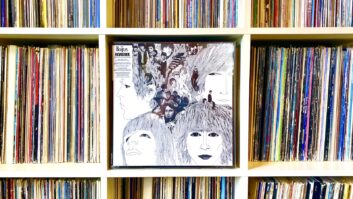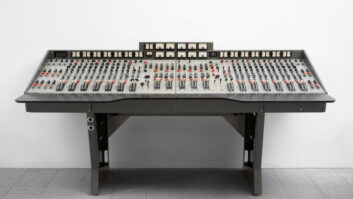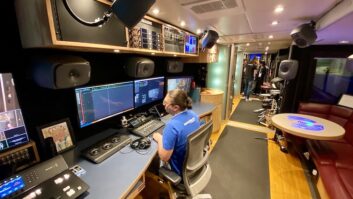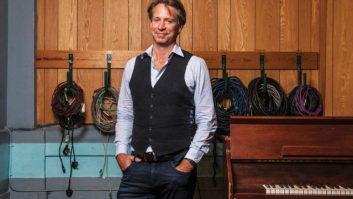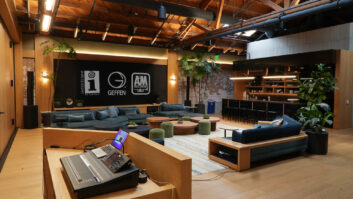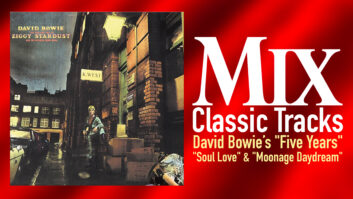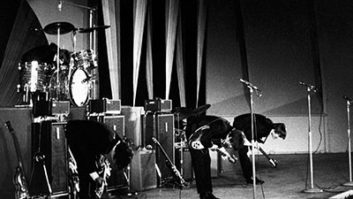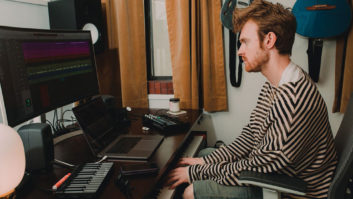Recording veteran Richard Langham recently spoke publicly for the first time about his experiences as the Second Engineer on many of the Beatles’ earliest recordings, including their first album. The event was held at Connecticut’s BeatExpo, and while the discussion occasionally plowed into mind-boggling minutia, the upside was to gain a glimpse of life inside Studio Number 2 at Abbey Road. While the affable Langham had plenty of fascinating stories and observations, here’s just a handful of his remarks, slightly edited for continuity:

On how he became a Second Engineer:
I was in the right place at the right time, talking to the right person. I’d left school and become a typewriter mechanic–which would make me redundant today since there are no typewriters! About six years after that, I met somebody in a pub in London, because I was always in the West End doing my thing, and he said, ‘What do you do?’ I told him, and I added, ‘But I’m looking for another job where I could do some overtime and make some money.’ He said, ‘Well, why don’t you become a recording engineering?’ and I said, ‘Yeah, why don’t I?’
He had just left EMI to go to commercial television which had just recently opened up in the UK. So I wrote to EMI and they said to come for an interview. I went and I had gone to grammar school, I spoke well, I could change a light bulb and that was basically all they wanted to know. When I got home the next day, by First Post, there was a letter: Can you start next Monday? That’s being lucky in the right place and talking to the right person. You’ll all find it happens to you in life or it’s happened already.
The second engineer duties evolved over a while, but basically, we made sure technically and atmospherically the artist was very, very comfortable and wanting for nothing. We set the microphones up and we also kept the logs of all the takes that were going. They were all timed, so if there was a false start or a breakdown, everything was logged because the producers might say, ‘That was okay except for the middle eight—have we got that from before?’ Then I would say, ‘I’ll tell you,’ but I would [perhaps] say, ‘That was longer, that was too long, it won’t cut in,’ so we would do another one.
So you kept a very accurate log of what was being recorded on that day and if anybody made a mistake, you can pull this. These days, they’ll go back and wipe everything, but we kept everything; we never wiped anything. So that was the second engineer. Also, we’d make sure there was tea there, biscuits, anything the artist wanted to keep them comfortable.
On meeting The Beatles Feb. 11, 1963 (The recording date of their first album):
Well, it was a very cold morning and I didn’t know any of them. I actually had to ask Norman Smith, who was the engineer, ‘Who are they? Who are who?’ so he introduced me and everything else. They were very businesslike, and they just had come down into London from the gig they had done the night before. But they were fine, just like any other group that’s coming in to record.
We helped them bring all their equipment in and set it all up. Because they were rushing around the country all the time and their amplifiers maybe broke down or something like that, there were no backs on the amplifiers, you see; they were just boxes with their speakers. And as I was putting it all up, we’d look for dirt inside, but there were bits of paper lying around in there, and I picked them up. They were notes from the girls from the dance floor who threw them up on the stage—they said ‘Please play this, please play that, this is my phone number.’ I guess they just read them and then threw them in the back of the amplifier, all of these bits of paper in there!
On the recording technology of the times:

It was 2-track. We used to do stereo and go down to mono, so we would record stereo but there would be mono feed, because that’s usually what the singles would be released as. Eventually we became twin-track so we could have the ability of dubbing afterwards. Now obviously, as you know, in those days, Dolby wasn’t around so you could only overdub to a certain extent before the tape took over. [Studio] Number 2 had up to four a track of the available tracks and we could bounce tracks onto one, reduce them all down, and so you had to be very careful, you know; you tried to get everything in on the first take.
On producer George Martin’s contributions:
Oh, I think you have to give quite a lot to George. He’d sit down with them—you’ve all seen the pictures of him on the stool with them all around—and they’d go through what they were going to do. He would then make suggestions about if he could put strings on, if he could piano on, or something like that, and this was all his work. I actually heard him use the expression, ‘If you all get killed tomorrow, I’ve got nothing to release; you have to record something.’ That was around about ’64.
On engineer Norman Smith:
He was ‘Ehhh.’ No, I don’t mean that at all; he was really nice! Wouldn’t take any rubbish from anybody. He knew what he was doing and was in complete control, and he looked after his staff as well.
Norman and I used to steal Ringo’s cigarettes, I’m afraid. We didn’t have any money in those days and we’d just go down to fix his microphone, we’d know he wasn’t there and George and I would stand there around his microphone and his cigarettes would be lying on the drum. We’d take the cigarettes out, but he never noticed so it was fine!
Special Thanks to Charles F. Rosenay of BeatExpo.
